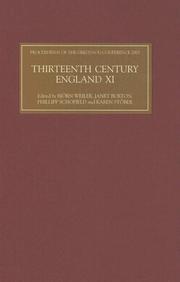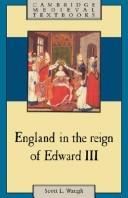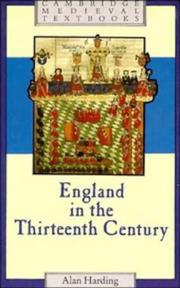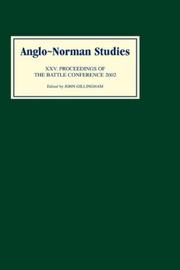| Listing 1 - 10 of 65 | << page >> |
Sort by
|
Book
ISBN: 9781783273096 9781787442276 Year: 2018 Publisher: Woodbridge ; Rochester The Boydell Press
Abstract | Keywords | Export | Availability | Bookmark
 Loading...
Loading...Choose an application
- Reference Manager
- EndNote
- RefWorks (Direct export to RefWorks)
Book
ISBN: 9781843833871 9781846156397 Year: 2008 Publisher: Woodbridge Boydell
Abstract | Keywords | Export | Availability | Bookmark
 Loading...
Loading...Choose an application
- Reference Manager
- EndNote
- RefWorks (Direct export to RefWorks)

ISBN: 9781843832850 9781846155994 Year: 2007 Publisher: Suffolk Boydell & Brewer
Abstract | Keywords | Export | Availability | Bookmark
 Loading...
Loading...Choose an application
- Reference Manager
- EndNote
- RefWorks (Direct export to RefWorks)

ISBN: 0521325102 0521310393 113916791X 9781139167918 9780521325103 9780521310390 Year: 1991 Publisher: Cambridge Cambridge University Press
Abstract | Keywords | Export | Availability | Bookmark
 Loading...
Loading...Choose an application
- Reference Manager
- EndNote
- RefWorks (Direct export to RefWorks)
The reign of Edward III is usually remembered for his stirring victories over the French and Scots. Yet these triumphs occurred against a domestic backdrop of economic upheaval, crime, high taxation and the Black Death. Edward's ability to pursue his ambitions amid such challenges shows the effectiveness of his leadership and the resilience of English institutions. This book examines the strains on English life in this remarkable era, and shows how an interlocking network of hierarchies at each level enabled Edward to reach into local communities to get what he needed. Compliance, however, required hard bargaining as subjects chafed under incessant taxes and royal demands and, during Edward's reign, parliament became the primary arena for negotiations between the king and the community. Professor Waugh's incisive account of these tumultuous events also contains an extensive guide to further reading, in addition to a glossary of the more abstruse medieval terms.
Edward III [King of England] --- anno 1300-1399 --- 942.03 --- Geschiedenis van Engeland--(1154-1399) --- England --- Great Britain --- Civilization --- -History --- -942.03 --- 942.03 Geschiedenis van Engeland--(1154-1399) --- -Edward III [King of England] --- History --- Arts and Humanities
Book
ISBN: 9780300187250 0300187254 9780300187281 0300187289 Year: 2016 Publisher: New Haven
Abstract | Keywords | Export | Availability | Bookmark
 Loading...
Loading...Choose an application
- Reference Manager
- EndNote
- RefWorks (Direct export to RefWorks)
This intriguing book tells the story of England's great medieval Angevin dynasty in an entirely new way. Departing from the usual king-centric narrative, Richard Huscroft instead centers each of his chapters on the experiences of a particular man or woman who contributed to the broad sweep of events. Whether noble and brave or flawed and fallible, each participant was struggling to survive in the face of uncontrollable forces. Princes, princesses, priests, heroes, relatives, friends, and others-some well known and others obscure-all were embroiled in the drama of historic events. Under Henry II and his sons Richard I (the Lionheart) and John, the empire rose to encompass much of the British Isles and the greater part of modern France, yet it survived a mere fifty years. Huscroft deftly weaves together the stories of individual lives to illuminate the key themes of this exciting and formative era.
Anjou, House of. --- Great Britain --- History --- 942.03 --- 942.03 Geschiedenis van Engeland--(1154-1399) --- Geschiedenis van Engeland--(1154-1399) --- HISTORY / Medieval.

ISBN: 052131612X 0521302749 1139167847 Year: 1993 Publisher: Cambridge : Cambridge University Press,
Abstract | Keywords | Export | Availability | Bookmark
 Loading...
Loading...Choose an application
- Reference Manager
- EndNote
- RefWorks (Direct export to RefWorks)
This is a comprehensive account of politics, government and society in thirteenth-century England. Three episodes stand out: the revolt of the barons against King John in 1215, the protest against the misgovernment of Henry III which began in 1258, and the resistance to the demands of Edward I on the resources of the land which came to a head in 1297. Professor Harding places these political events in the context of social and economic change, in order to provide a rounded account of the century. The introduction demonstrates the constitutional importance given by past historians to the period which saw the framing of the Magna Carta and the beginnings of Parliament and statute law. The central chapters describe the developing social structure of peasants, townsmen and professional people, knights, clergy and lay magnates. The book finally sees the politics of the century in terms of royal ambitions to dominate Britain and to play a leading role in Europe.
942.03 --- Geschiedenis van Engeland--(1154-1399) --- 942.03 Geschiedenis van Engeland--(1154-1399) --- England --- Great Britain --- Civilization --- History --- Arts and Humanities
Book
ISBN: 0521295750 0521226120 Year: 1979 Publisher: Cambridge Cambridge University Press
Abstract | Keywords | Export | Availability | Bookmark
 Loading...
Loading...Choose an application
- Reference Manager
- EndNote
- RefWorks (Direct export to RefWorks)
942.03 --- Geschiedenis van Engeland--(1154-1399) --- 942.03 Geschiedenis van Engeland--(1154-1399) --- History as a science --- Paris, M. --- Matthew Paris

ISBN: 0851159419 9781846150197 1280545208 1846150191 9786610545209 Year: 2003 Publisher: Woodbridge Boydell and Brewer
Abstract | Keywords | Export | Availability | Bookmark
 Loading...
Loading...Choose an application
- Reference Manager
- EndNote
- RefWorks (Direct export to RefWorks)
Book
ISBN: 9780300215519 0300215517 Year: 2016 Publisher: New Haven Yale University Press
Abstract | Keywords | Export | Availability | Bookmark
 Loading...
Loading...Choose an application
- Reference Manager
- EndNote
- RefWorks (Direct export to RefWorks)
This first modern study of Henry the Young King, eldest son of Henry II but the least known Plantagenet monarch, explores the brief but eventful life of the only English ruler after the Norman Conquest to be created co-ruler in his father's lifetime. Crowned at fifteen to secure an undisputed succession, Henry played a central role in the politics of Henry II's great empire and was hailed as the embodiment of chivalry. Consistently denied direct rule, the Young King was provoked first into heading a major rebellion against his father, then to waging a bitter war against his brother Richard for control of Aquitaine, dying before reaching the age of thirty having never assumed actual power. This history provides a richly coloured portrait of an all-but-forgotten royal figure tutored by Thomas Becket, trained in arms by the great knight William Marshal, and incited to rebellion by his mother Eleanor of Aquitaine, while using his career to explore the nature of kingship, succession, dynastic politics, and rebellion in twelfth-century England and France.
Henry --- Family --- Great Britain --- Grande-Bretagne --- Kings and rulers --- Biography --- History --- Rois et souverains --- Biographies --- Histoire --- Henry, --- Family. --- Hendrik --- Henricus --- Plantagenet, Henry, --- 942.03 --- 942.03 Geschiedenis van Engeland--(1154-1399) --- Geschiedenis van Engeland--(1154-1399)
Book
ISBN: 1871615569 1871615488 Year: 2003 Volume: 15 Publisher: Donington Shaun Tyas
Abstract | Keywords | Export | Availability | Bookmark
 Loading...
Loading...Choose an application
- Reference Manager
- EndNote
- RefWorks (Direct export to RefWorks)
Black Death --- Fourteenth century --- Peste noire --- Quatorzième siècle --- Great Britain --- Grande-Bretagne --- History --- Histoire --- 942.03 --- Geschiedenis van Engeland--(1154-1399) --- 942.03 Geschiedenis van Engeland--(1154-1399) --- Quatorzième siècle
| Listing 1 - 10 of 65 | << page >> |
Sort by
|

 Search
Search Feedback
Feedback About UniCat
About UniCat  Help
Help News
News